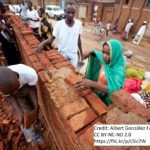This rapid evidence review provides an assessment of negative and positive coping mechanisms of different groups (based on wealth (below the poverty line/elites), gender, age, (dis)abilities, geographies (rural/urban), and ethnicity of people in South Sudan in relation to different types of shock. It draws predominantly on a range of grey literature from multinational and ...» more
Workplace-based Learning and Youth Employment in Africa
Workplace-based learning is a supply-side approach to youth employment that includes practical or on-the-job training that is usually provided through an apprenticeship, internship, learnership , work placement or other practical training component of a vocational education or training programme. For the workplace-based learning approach to be effective, it requires ...» more
Lessons from stabilisation, statebuilding, and development programming in South Sudan
This rapid literature review collates lessons from major evaluations and learning reviews from development, state-building and stabilisation programming in South Sudan since independence in 2011. Key findings include: Donors in South Sudan have had to transition from humanitarian to development aid and back and forth a number of times as conflict has broken out. Donors ...» more
Engaging new governments on development priorities
This rapid literature review considers donor engagement with newly elected governments in aid recipient countries. It sought to focus on the immediate period after a new administration is elected and takes office. However, despite the importance of donor-government engagement, few studies were located during the timeframe of this review that focuses on how donors should engage ...» more
Livestock and Conflict in South Sudan
Livestock are critically important in South Sudanese society1 and this is reflected in the role livestock play in the country’s conflict, both serving as drivers of conflict and being negatively impacted by the conflict, with the two often reinforcing each other in a vicious cycle. This review drew largely on a mixture of academic and grey literature to assess the ...» more
Local Governance in South Sudan: Overview
The system of local governance in South Sudan (independent since 2011) comprises both formal state structures and traditional authorities. The three tier local government structure faces significant capacity and resource constraints – manifested in weak effectiveness - which are being exacerbated by the government’s decision to increase the number of states in South Sudan from ...» more
Lessons from Local Governance Programmes in South Sudan
Donor-funded (governance) programming in South Sudan has been hampered by numerous challenges, notably renewed conflict and economic crisis. The literature points to a general failure by donors to appreciate these challenges and to donors’ overestimating state capacity, leading to overambitious programmes. Donors are urged to be flexible, integrate political and development ...» more
Cultural Practices on Burial and Care for the Sick in South Sudan
The literature on cultural practices for burial and care for the sick among individual ethnic groups in South Sudan was very limited. However, it clearly points to the importance of proper burials among all ethnic groups: these typically entail washing the body of the deceased; it can take several days before burial takes place; and graves are often located within or close to ...» more
Disability in South Sudan
Decades of conflict in South Sudan, pre and post-independence in 2011, poverty and poor access to services have increased the rate of disability and rendered people with disabilities more marginalised and excluded as a result of the numerous attitudinal, environmental, and institutional barriers they face, and the lack of concerted efforts to include them. This rapid review ...» more
Refugee return in protracted refugee situations
Voluntary repatriation/return is seen as one of the durable solutions to protracted refugee situations and is the ‘preferred’ solution of the international community. Successful or sustainable return processes require the reintegration of refugees, which can be complicated by their protracted refugee experience and conditions in the country of origin. Evidence from case ...» more
Democracy strengthening in Sudan
This report summarises key points of development work and research conducted on democracy strengthening in Sudan. It excludes the nation-state of South Sudan, but does include some work covering the southern areas of Sudan before the secession in 2011. Most of the literature focuses on democratic elections, from voter education to election conduct, but this report also tries to ...» more
Border insecurity in North Africa
The literature on border security in North Africa has several key themes: security and terrorism; migration; and goods trafficking. These issues are all intertwined. Migration and trafficking tend to follow the same geographical routes, which or may not also include weapons smuggling for extremist groups. In addition, radicalists’ movements across borders frequently interact ...» more
Conflict and development in Sudan Key research institutions
There are a limited number of UK-based research institutes that include a focus on conflict and development in Sudan. Experts indicate that the Rift Valley Institute (RVI) is the main organisation involved in Sudanese research. Other research institutes that incorporate Sudan or South Sudan in their programming include: the Royal African Society; the Royal Institute of ...» more
Trust Funds and the Private Sector
A ‘Trust Fund’ or ‘Multi Donor Trust Fund’ (MDTF) is a multi-agency funding mechanism, designed to receive contributions from more than one donor (and often also the recipient government), that is held in trust by an appointed administrative agent. This report focuses primarily on trust funds in conflict or crisis-affected contexts that have been designed to support recovery of ...» more
Donor Initiatives to Engage with South Sudanese Diaspora
This report provides details of donor programmes designed to engage with the South Sudanese diaspora with the goal of supporting their development efforts in the country. It also provides details of similar programmes with the Somali diaspora and diaspora from other post-conflict states in Africa. A small number of initiatives are currently being undertaken with the South ...» more

